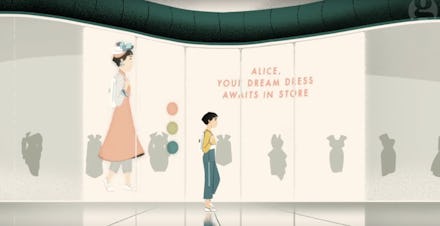This Creepy Video Shows What the World Could Look Like When Robots Take Our Jobs

Imagine waking up and going to the bathroom to brush your teeth while reading the news off your touchscreen mirror.
The bathroom mirror, formerly a vestibule for aspirin and antibiotics, can also detect when you're sick, which it says you are. Your closet picks out your clothes for you based on where you're going (work) while your robotic cat purrs and rubs against your leg. Why do you have a robotic companion? Because you'll never have to mine a litter box again. On the way to work in your self-driving cab, you stop by an automated medical kiosk to get scanned for possible illness. The bot finds you have a bronchial infection and dispenses antibiotics for you.
This is the future that the Guardian has dreamed up and animated, based on an 2013 Oxford study that posits 47% of jobs will be automated by 2050. The video titled "The Last Job on Earth: Imagining a Fully Automated World" is a peek into a future that is both awe-inspiring and grim — and yet not fantastic.
In the world of tomorrow, some things are the same as we know them now. We move about on hover boards or walk or ride in vehicles to get places. Mechanized things still malfunction and in the future we'll still issue a swift kick to get something to work.
The real difference between now and then is that robots occupy large swathes of jobs that used to belong to humans. And that has some grave effects on the people who are no longer employed.
As our protagonist rides to work, she sees people lined up outside of a building with boarded up windows and a crooked sign that reads "Food Bank: Food for people in crisis." Journalist Paul Mason, who wrote an intro to this film, says just because advances in robotics will likely usher in a third industrial revolution — and with it massive unemployment — we shouldn't avoid automation. Rather, we should rethink the tethering of wages to work, Mason argues. The theory hinges on implementing a universal basic income: a minimum salary for everyone doled out by the government that ensures people can afford housing and food, regardless of whether they're working or not.
Universal basic income has both liberal and conservative supporters and has even been floated as a way to compensate the work of women who run a household, but don't have a wage-based job. However, opponents argue that the theory of basic income is too utopian. "Replacing our complex system of welfare benefits with a single equal payment for everyone means one of two things: either the universal basic income is too low to replace the additional benefits people with particular needs receive, for example, those with disabilities or children; or, if it's high enough not to leave those people out of pocket, then it costs much more than the present system we have," says author Emran Mian in an op-ed for the Independent. Plus, a single income could also overcompensate people who don't need the money, he says, concluding that welfare is a messy business.
Neither the film nor its introduction pose a solution to this eventuality. Instead, the film nudges people and government officials to think about ensuring we're not left behind in the race to automate — any less and an angry unemployed base may just rise-up.